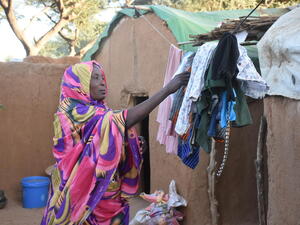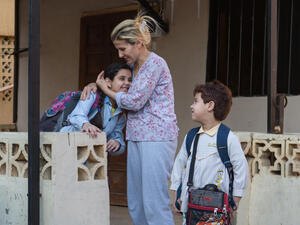UNHCR chief warns that worsening Darfur crisis threatens entire region
UNHCR chief warns that worsening Darfur crisis threatens entire region

A camp for displaced people in South Darfur. Security in many parts of Darfur has steadily deteriorated since last December.
GENEVA, September 8 (UNHCR) - UN High Commissioner for Refugees António Guterres warned on Friday that the worsening situation in Sudan's Darfur region threatens to spark another round of massive displacement that could destabilise the entire region.
"Humanitarian agencies are already struggling to cope with the enormous needs of some two million internally displaced people inside Darfur, plus more than 200,000 refugees in 12 UNHCR-run camps across the border in Chad," Guterres said in Geneva. "Deteriorating security has left us unable to provide even minimal help across wide areas of Darfur, and resources in neighbouring Chad have been stretched to the limit. An already bad situation is worsening by the day."
Guterres cited the lack of security and access as well as continuing uncertainty over the deployment to Darfur of a UN peacekeeping force that was recently approved by the UN Security Council. The Khartoum government opposes the UN deployment. In addition, thousands of Sudanese troops have been deployed to Darfur in recent weeks, prompting fears of a major military offensive that could lead to yet more displacement.
"Millions of people are already at grave risk," the High Commissioner said. "Hundreds are still dying amid ongoing violence, and thousands are still being forcibly displaced. Urgent international action is needed to put pressure on the parties to the conflict and to convince everyone involved on the ground to let humanitarian agencies safely carry out their work. Lives depend on it. If things don't improve, we're heading for a major catastrophe."
UNHCR has six offices and nearly 100 staff in South and West Darfur to carry out protection monitoring activities. Security in many parts of Darfur has steadily deteriorated since last December.
A dozen aid workers have been killed since May, and humanitarian convoys are repeatedly attacked and vehicles stolen. Offices and compounds have also been attacked, and staff are only able to travel by helicopter to reach some areas.
Guterres said the worsening situation in Darfur could also have dire consequences for the rest of the region. Neighbouring Chad, where a dozen, remote UNHCR camps currently hold more than 200,000 Darfur refugees, is already grappling with cross-border insecurity that has displaced some 50,000 Chadians and sent about 15,000 of them fleeing into Darfur.
The Darfur crisis also has the potential to exacerbate continuing instability in the northern Central African Republic. Some 46,000 Central African refugees are housed in three UNHCR camps in southern Chad.
"Chad has been extremely generous in helping refugees, but it's now close to the breaking point," Guterres said. "It is hard to comprehend the enormity of the crisis we would face if there is additional large-scale displacement in Darfur. Even without the violence and insecurity, humanitarian operations in this remote and resource-poor region are extremely difficult."
The one bright spot in the region, the UNHCR repatriation of thousands of Sudanese refugees and displaced back to their homes in southern Sudan, could also be severely affected should the Darfur crisis worsen.
Staff and resources would almost certainly have to be diverted from the southern Sudan operation to contend with any new displacement from Darfur. The southern Sudan repatriation operation is itself facing a severe funding shortfall.








